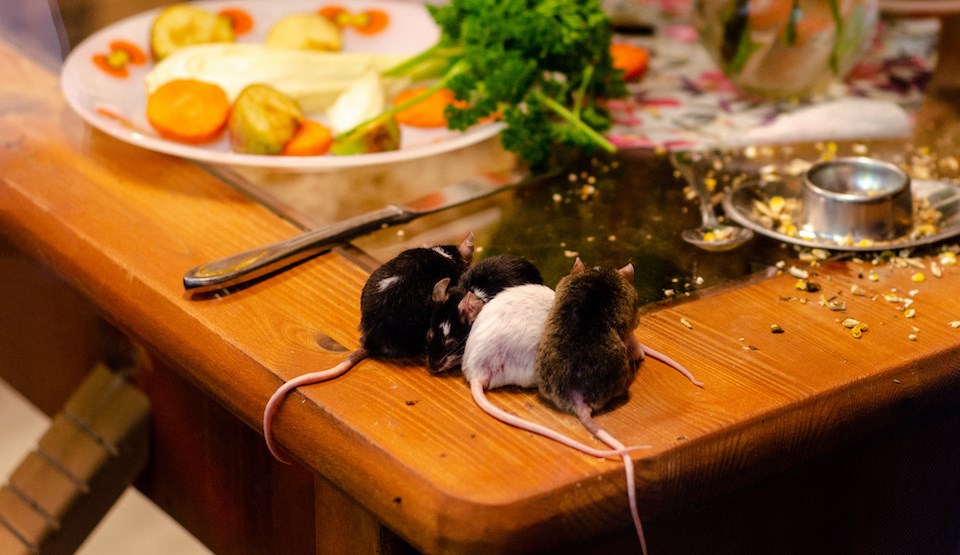You might not be cozying up alone in your abode this fall (and no, I don't mean you'll be joined by ghosts and ghouls).
Resident rat and mice populations start thinking about moving indoors as temperatures dip down across Metro Vancouver, meaning that you might have an unwelcome house guest (or several) joining you in the coming weeks and months.
Rodents have lived alongside people for centuries, so they are experts at finding ways to get inside your pad and stay there. While mice aren't shy about showing themselves, rats can be living in your walls and attics, making minimal noise and scampering through your house without showing their crafty faces.
When homeowners can't keep their pest problems at bay, Mike Londry and his crew at Westside Pest Control provide them with solutions.
But not all pests are created equal -- and some of them are surging in numbers.
Vancouver pest company sees surge in mouse calls
While he received an uptick in rat calls several months ago, Londry says they have "flattened out and almost declined," while mice calls have increased by a whopping 100 per cent.
The pest control company owner can't comment on exactly why the mice numbers have seen such a drastic change but thinks it might have something to do with B.C. banning second-generation anticoagulant rodenticides (SGARs).
The ban came into effect on Jan. 21, and Westside Pest Control has seen a stark increase in mouse calls over the summer. And while exterminators don't always use rodenticides on rats, many of them use poison to eliminate mice.
"With mice, you have to throw everything at them," Londry tells V.I.A. "You won't do it with glue boards or snap traps or even rodenticide."
Many companies leant on SGARs to tackle infestations, but Westside Pest Control has historically tried other methods to remove mice before using poison. The team will do a full investigation of a home or business to find entry points along its perimeter and then set traps strategically, Londry explains.
But a severe mouse infestation isn't solved overnight.
Mice are difficult to get rid of
Rats typically live in attics, walls, basements, or other places outside of homes and use entry points to sneak in and score a meal, water, or nesting materials. This means that they are easier to keep out since they are coming and going frequently and the entry points can be located and blocked.
Mice, on the other hand, are notorious for living alongside humans. The petite creatures live inside rooms where people eat, sleep, bathe, and cook and they aren't always sneaky about it. Homeowners often see them running alongside the perimeter of a room or across a counter.
Since they make themselves so comfortable in a person's living quarters, mice can't be blocked out. As such, many companies relied on poison to get rid of them. Without using a rodenticide, it may take over a month to rid a home of the little pests.
"A mouse is like a guest with a bracelet at an all-inclusive resort; they never have to leave because they have everything they need there and their skill for avoidance is admirable."
Londry says that rats generally try to avoid people, meaning that homeowners rarely see them. In fact, he says his technicians rarely see them on house calls, since they scatter the moment they are spotted.
But the skinny-tailed rodents are built a bit differently near the water. On the North Shore and Granville Island, they are the "meanest and toughest of the tough."
"In Granville Island, there was a rat six feet away from me and it just stared and didn't move," he recalls, adding that he has been less afraid of bears he spotted in the wild.
Within a couple of hundred meters from the water, rats will be shockingly bold in a variety of settings, too.
"They are a different breed of rats," he explains, adding that he's been at a restaurant where rats were in the kitchens eating and moving around completely "unconcerned" with the people working around them.
Londry jokes that "New Westminster and Langley rats would get their butts kicked" by the seaside rodents.
How to keep rodents out as the Metro Vancouver weather changes
To prevent a surge in unwelcome rodent guests, inspect the perimeter of your home to see if there are new points of entry and seal them accordingly. Mice and rats have hairs on their body that tell them they are safe if they have something touching their bodies, which is why they slink around homes closely. They aren't necessarily always looking for a way in, but are hunted by raptors, foxes, and coyotes and have "their backs always up against the wall" both literally and figuratively.
A common place that mice sneak in is under the garage, where the rubber on the bottom can become brittle and mice will chew through.
If you have pests, you can try setting up traps in your home. Rats and mice are currently looking for nesting material so you can use that to set the traps as bait. They are often smart enough to lick peanut butter or Nutella off a trap without setting it off, but string or cotton is more difficult to pull off.
Ultrasonic devices may be helpful as a mouse deterrent but will not work if there is already one in the house.
"I compare it to someone who has a neighbour that plays terrible, loud music. If you're brand new neighbour starts blaring music, you might move, but if you lived there for 10 years and the rent never goes up, you might not."



